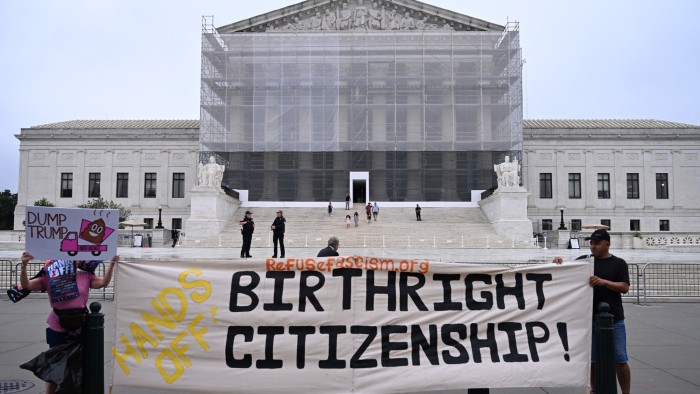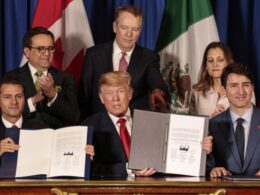Happy Monday Swampians, it’s Brooke Masters, the FT’s US managing editor, filling in for Rana.
Exactly 249 years ago this week, the Continental Congress, sitting in Philadelphia, declared independence from the “absolute Tyranny” of the British crown. Their experience with a mighty, distant ruler then led them to set up a government that deliberately checked the power of its executive with two other independent branches of government.
Today the balance of power between those branches is being tested and litigated, with potentially profound consequences for a country founded on the principle of no more kings.
Last Friday, the US Supreme Court handed President Donald Trump a big victory by ruling that individual federal judges cannot issue nationwide orders blocking his policies while they are being challenged in the courts. The 6-3 decision did not rule on the constitutionality of his controversial order revoking birthright citizenship — but it largely eliminates what has been the most effective tool for advocates fighting that change and other contentious policies.
The fight over nationwide injunctions has been brewing for years. As it has become harder and harder to get legislation through Congress, presidents of both parties have turned to executive orders to push through policies on hot button issues, ranging from gay rights and immigration policy to climate change and student loans. When opponents then challenge the orders in the courts, they have asked the courts to “stay” the policy while the cases are heard — the rationale is that major changes made without Congressional approval shouldn’t go into effect while their constitutionality is in doubt.
But the second Trump administration, which has issued a blizzard of executive orders in its first six months, has refused to wait for the court process to play out. In the first 20 weeks of his term, the president filed 19 appeals to the Supreme Court asking for the injunctions to be lifted, compared to 19 for the entire Biden administration and eight in the George W Bush and Barack Obama presidencies combined.
Now that tactic has paid off in spades. “When a court concludes that the Executive Branch has acted unlawfully, the answer is not for the court to exceed its power, too,” Justice Amy Coney Barrett wrote for the conservative majority in the birthright case.
Trump intends to seize the opening. Calling it a “monumental victory”, he told reporters on Friday that his administration will use the decision to challenge other nationwide injunctions that have prevented him from cancelling grants and changing refugee policies.
The administration is also likely to continue to push through big policy changes with executive orders, partly because it cannot get them through Congress. The Senate parliamentarian, a non-partisan official who enforces the chamber’s rules, stripped a number of proposals out of the One Big Beautiful Bill Act that would have provided bulk Congressional approval for some of Trump’s most contentious plans as part of the larger package. Among them were banning the use of Medicaid funds for gender affirming care, new hurdles for lawsuits against the federal government, and the elimination of funding for the Office of Financial Research.
That means Congress will now either have to pass them separately — a difficult task when Republicans have such narrow majorities — or the president will attempt to simply skip that step.
The administration is also moving to strengthen the presidency’s power over spending, setting up another big conflict about what the constitution means when it grants Congress the exclusive right to appropriate money. Trump’s government has already frozen many types of spending and slowed or stopped processing applications for grants, even though the money has already been set aside.
A 1974 law passed after the Watergate scandal explicitly sought to limit the president’s ability to impound or refuse to spend funds that Congress has authorised, but advocates of a strong executive branch argue that it is unconstitutional. That conflict, too, may end up in the Supreme Court.
Justice Ketanji Brown Jackson wrote in her dissent in the birthright case that she can see where all this is going and she doesn’t like it one bit: “Eventually, executive power will become completely uncontainable, and our beloved constitutional republic will be no more.”
This week, I have the good fortune to be able to call on Jonathan Derbyshire, the FT’s US opinion editor, to respond to my musings. Jonathan, you only recently moved to New York from the UK, a country that still has a king and a parliamentary system that gives executive power to the ruling party in the legislature. What do you make of this debate? Are the fears about the erosion of America’s system of checks and balances overblown?
Recommended reading
-
The unexpected victory of Zohran Mamdani in the New York mayoral primary has prompted enormous amounts of anguished commentary about the future of the Democratic party. But I really liked this more offbeat take from the New York Times’ Emma Goldberg. She frames it as a workplace battle between baby boomer bosses and their fractious millennial underlings.
-
After rising at 4.55am to catch a flight back to New York from a business trip, I was more than ready to dive into Isabel Fattal’s fascinating look into why Americans like to brag about giving up sleep for work. It’s the latest in The Atlantic’s use of its own archives to explain the present.
-
If you want to scare yourself about the future of the global financial system, have a read of my colleague Pilita Clark’s terrifying piece examining how climate shocks could trigger the next market meltdown. Politicised attacks on climate data and analysis are leaving us vulnerable at a time when extreme weather events are increasing.
Jonathan Derbyshire replies
Hello, Brooke. We in the UK do have a Supreme Court, though it is a relatively recent creation — it replaced the Appellate Committee of the House of Lords in 2009 — that, in the eyes of some observers at least, has been grafted somewhat uncomfortably on to the body politic of our parliamentary system. And while its job is to hear “appeals on arguable points of law of the greatest public importance”, the stakes in its deliberations rarely seem as momentous as do those of the court here in the US.
Now, one of the besetting temptations for any journalist reporting or commenting on the Trump administration, particularly a non-American like me, is to see every executive order, and indeed every opinion passed down by the conservative majority on the Supreme Court, as one more step on the ineluctable path towards authoritarianism — or worse.
I’m grateful to you, therefore, for making it clear that the court in this instance did not rule on the constitutionality of Trump’s order revoking birthright citizenship. That particular protection, enshrined in the 14th Amendment of the US constitution, remains in place — for now.
Nonetheless, everything you say about the court’s decision last Friday suggests to me that President Trump was quite right to crow about the scale of his victory. And Justice Jackson, for her part, was right too to say in her dissent that this decision “has gifted the Executive with the prerogative of sometimes disregarding the law”.
This might not be the next step on the road to American fascism, but it does seem to me to cement the idea of concentrating more power in the hands of the president. In May, the Supreme Court voted by the same 6-3 margin to enhance presidential control by refusing to block Trump’s firing of the head of the National Labor Relations Board, even though it was set up as an independent agency. That decision and others like it rely on a theory of presidential power expressed in the notion of a “unitary executive”.
Samuel Alito, one of the justices in the conservative majority, has argued that the theory “doesn’t have to do with the scope of executive power”; rather, “it has to do with who within the executive branch controls the exercise of executive power, and the theory is the constitution says the executive power is conferred on the President”.
What was it you were saying about “no more kings”, Brooke?
Your feedback
We’d love to hear from you. You can email the team on swampnotes@ft.com, contact Brooke on brooke.masters@ft.com and Jonathan on jonathan.derbyshire@ft.com, and follow them on X at @jderbyshire and @brookemasters. We may feature an excerpt of your response in the next newsletter
Source link









